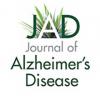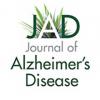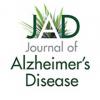8 July 2025
Cyrus A. Raji, MD, PhD, is the recipient of the 2025 Alzheimer Award
The Journal of Alzheimer’s Disease (JAD) is pleased to announce that Cyrus A. Raji, MD, PhD, is the recipient of the 2025 Alzheimer Award. The award is presented by the journal in recognition of Cyrus Raji and colleagues’ groundbreaking article “Exercise-Related Physical Activity Relates to Brain Volumes in 10,125 Individuals”.1 The awardee is selected by the journal’s Editorial Board from the 2024 year’s volume (800 papers), and is presented with the Alzheimer Medal, a 3" bronze medal with the likeness of Alois Alzheimer, and a cash prize of $7,500. The 2025 award is proudly sponsored by IOS Press (www.iospress.com).
2 June 2025
New metric predicts the likelihood of amyloid presence and leads the way in early Alzheimer’s detection
Neuroscience technology innovator Cognivue®, today announced a scientific breakthrough with the launch of the Cognivue Amyloid Risk Measure (CARM)*, a novel metric that predicts the likelihood of the presence of amyloid—a key biomarker of Alzheimer’s disease (AD). Now available as an optional feature on the Cognivue Clarity® device (based on FDA-cleared technology), CARM represents a significant advancement in the early detection of Alzheimer’s by helping healthcare providers identify those at risk of cognitive impairment, even before symptoms emerge.
12 December 2024
Therapeutic Trials in Alzheimer’s Disease: Where Are We Now?
Alzheimer’s disease (AD), the most common form of dementia among older adults, remains a major scientific and clinical challenge, particularly regarding its early diagnosis and treatment. Decades of significant efforts have been made to find the cause(s), pathogenic mechanisms, biomarkers for early detection, and treatment of AD. A new collection of papers released simultaneously in the Journal of Alzheimer’s Disease and its companion book series Advances in Alzheimer’s Disease provides an in-depth overview and assessment of the state of the art of treatments and their varying degrees of success and the research behind them.
10 December 2024
Journal of Alzheimer’s Disease publishes key UNTHSC study on biomarkers in diverse populations
A team from the University of North Texas Health Science Center at Fort Worth has had a key study published in the Journal of Alzheimer’s Disease. Lubnaa Abdullah, Psy.D., ABPP, Assistant Professor within the Department of Family and Osteopathic Manipulative Medicine at the Texas College of Osteopathic Medicine and Fan Zhang, PhD, James Hall, PhD, and Sid O’Bryant, PhD. conducted the largest characterization of plasma neurofilament light chain (NfL) in community-dwelling non-Hispanic Blacks.
22 November 2024
New Study Highlights Physician Perspectives on Emerging Anti-Amyloid Treatments for Alzheimer’s Disease in Israel
In a recent study, Tel Aviv Sourasky Medical Center has shed light on physician attitudes toward novel anti-amyloid treatments (ATT) for Alzheimer’s disease (AD), revealing a spectrum of opinions across key specialties. With Israel’s health system structured to provide universal healthcare, the high out-of-pocket costs for new AD therapies have raised questions among medical professionals about the feasibility and practicality of implementing these treatments.
9 October 2024
Thirty Years of Alzheimer's Disease Research: Preventive Strategies Hold Promise for Risk Reduction While Cure Remains Elusive
A supplement celebrating the 100th volume of the Journal of Alzheimer’s Disease provides a unique and insightful overview of the state of the art in the field
12 September 2024
Research Spotlight: Implementation of a Lifestyle Dementia Prevention Intervention
This intervention is a virtual, group-based program for older patients (age 60+) with subjective cognitive decline who are at risk for AD/ADRD. Group members learn mindfulness and behavioral strategies to set goals to improve physical activity, sleep, nutrition, and other lifestyle factors linked to lower rates of AD/ADRD. The goal of our study was to qualitatively identify the challenges and supportive factors impacting the acceptability, appropriateness and feasibility of this intervention within the healthcare setting based on focus groups with healthcare professionals.
11 September 2024
Journal of Alzheimer's Disease's Outreach Initiatives Aim to Amplify Underrepresented Voices from Africa and South America
As part of its commitment to represent researchers from all parts of the world, the Journal of Alzheimer's Disease (JAD) is pleased to announce active outreach initiatives to amplify the voices of underrepresented researchers from Afric
29 August 2024
2024 JAD Editorial Board Update
To keep our JAD editors, authors, and readers informed of JAD's progress and development, the journal hereby shares the 2024 editorial update, which includes highlights such as the best-viewed papers of 2023, the most popular press releases, and journal statistics such as the turnaround times and submission rates.
14 August 2024
Possible explanation for link between diabetes and Alzheimer's
People with type 2 diabetes are at increased risk of Alzheimer's disease and other adverse cognitive health issues. A new study conducted at by Umeå University, Sweden, shows that the reason for the correlation may be that people with type 2 diabetes have more difficulty getting rid of a protein that potentially increases the likelihood of contracting the disease.
















